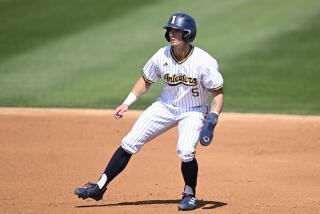IRVINE : UCI Team Is Finalist in Computer Contest
- Share via
After outperforming students from 18 other universities, four top computer science students from UC Irvine will compete next month with students from around the world for honors as the brightest and speediest computer programmers.
Although winning the Assn. for Computing Machinery’s international programming competition in Texas would not prompt spontaneous parades in UCI’s Aldrich Park, the contest is considered the equivalent of the Super Bowl in a field with few ways for students to show their talents.
To get this far, the UCI team had to outthink and out-program teams from all but one university in the Southern California regional competition, held last November in Las Vegas. In that competition, UCI beat UCLA and Caltech--two schools that have held the international programming title.
UCI placed second behind a university in New Zealand, which is also competing in the Southern California division. The top two teams from each region qualify for the finals, scheduled for March 6 in San Antonio.
Members of the UCI team are Andrew Bliss, Robert Hildenbrand, Chung Ng and Mark Taparauskas. All are seniors except Taparauskas, who is a graduate student majoring in computer science.
The four team members have been preparing for the competition with sample problems. The team also will compete next Sunday in a campus practice competition against graduate students and computer science faculty, said doctoral student Hari Asuri, the team’s coach.
The contest sponsor, AT&T; Computer Systems, has provided UCI with the same kind of desk-top computer and software that will be given to each team during the competition.
The four team members are presented with six or more problems and given one computer to solve them during the five-hour competition, Asuri said, adding that this makes it necessary for the team to formulate a strategy that will get the problems solved quickly.
UCI’s strategy is to split the team in half. Each two-member team attacks separate problems. One pair will use the computer to code and run their solution while the other might still be pondering.
The problems are split even further with each pair, said Ng, 21, who teams up with Hildenbrand.
“For each problem, we divide that into two halves also,” Ng said. “Usually one will work on the main logic of the program and and the other will work on other parts. . . .”
The questions sometimes look deceptively simple but actually require intense thought, said Hildenbrand, 20, of Irvine. For instance, one problem consisted of a book index written in a made-up language. The team had to devise a program that would figure out the alphabetical order of the new language.
“Some of the problems--you look at them and you’re stumped literally for hours,” Hildenbrand said.
“You’re psyched out by the problems because you’re given them all immediately,” said Bliss, 21, who lives in Huntington Beach. “You have to pick one that looks best and start on that, otherwise you feel like you’re wasting a lot of time. You start coding and the adrenaline starts pumping and things get hyper.”
Although UCI will be up against some of the top universities in the country, Asuri is optimistic that the team will perform well.
“All of these people are really smart, very good programmers,” he said. “They’re the best in the school right now.”


